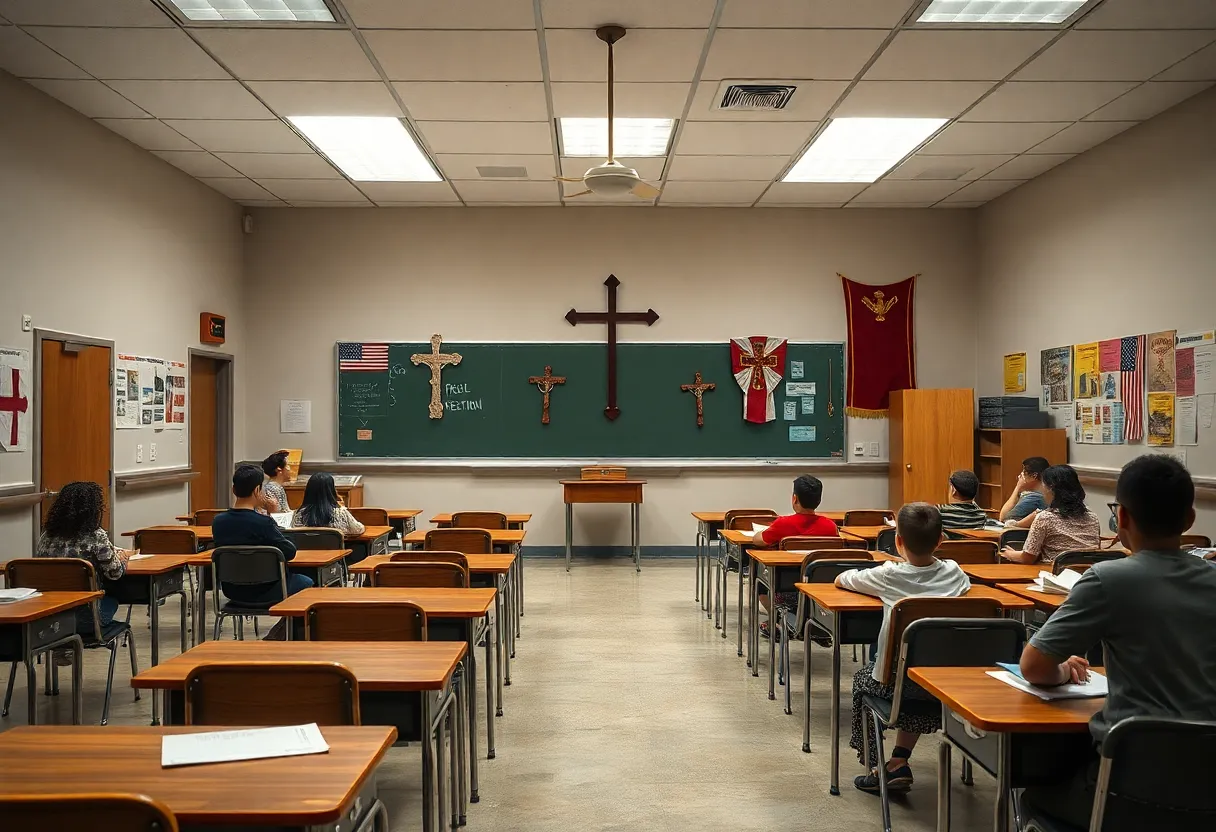News Summary
The 5th U.S. Circuit Court of Appeals has ruled against Louisiana’s law requiring the display of the Ten Commandments in public schools, deeming it unconstitutional. The unanimous decision reinforces the First Amendment’s establishment clause, upholding an earlier injunction. The law was challenged by diverse family groups, supported by civil liberties organizations. Louisiana officials have expressed intentions to appeal the ruling, which may set a precedent as similar legislative efforts emerge across various states. This ruling underscores ongoing debates about religious expression in public education.
New Orleans, Louisiana — A significant ruling from the 5th U.S. Circuit Court of Appeals has struck down a Louisiana law that mandated the display of the Ten Commandments in public K-12 schools, colleges, and universities, declaring the law unconstitutional. The decision, which was made by a unanimous three-judge panel, found that the law violated the establishment clause of the First Amendment, thereby upholding a prior injunction by a lower court.
The law in question, known as House Bill 71, was signed into effect by Republican Governor Jeff Landry in June 2024. Under this law, schools were required to display an 11-inch by 14-inch poster featuring a Protestant Christian version of the Ten Commandments in every classroom. However, the legal challenge arose after nine families—representing a wide range of religious beliefs, including Catholic, Jewish, and Unitarian—filed a lawsuit against the law, garnering support from the ACLU and Americans United for Separation of Church and State.
U.S. District Judge John deGravelles had initially issued an injunction against the enforcement of the law, stating that it would cause irreparable harm to the plaintiffs’ rights under the First Amendment. The appellate court’s ruling reaffirmed this stance, demonstrating a commitment to upholding constitutional protections against the establishment of religion in public institutions.
Judge Irma Castillo Ramirez authored the appellate opinion, with support from judges James Dennis and Catharina Haynes, two of whom were appointed by Democratic presidents. The court’s findings highlighted the lack of substantial evidence to support the claim that the Ten Commandments hold historical significance as part of U.S. law. The judges pointed out that historical testimonies indicated that assertions connecting the Ten Commandments to America’s founding were baseless myths and fabrications.
The state of Louisiana had argued that the display of the Ten Commandments served a secular educational purpose. However, the appellate court deemed this rationale insincere. In light of these findings, the ruling has been lauded as a victory for civil liberties organizations, reflecting an ongoing national discourse about the role of religious expression within public education systems.
Following the ruling, Louisiana Attorney General Liz Murrill expressed her intention to appeal the decision, potentially leading the case to the U.S. Supreme Court. Governor Jeff Landry publicly supported this course of action, emphasizing the belief that the Ten Commandments serve both educational and historical roles in the school environment.
This ruling is noteworthy not only for its immediate implications but also for its place within broader national trends. Similar legislative efforts to display the Ten Commandments are currently underway in various states, including Texas and Arkansas. These movements have sparked concerns regarding the potential implications for religious freedom and the concept of separation of church and state in educational settings.
Historically, the U.S. Supreme Court has consistently ruled that mandatory displays of the Ten Commandments in public schools breach the establishment clause. The current ruling from the 5th Circuit underscores this precedent and exemplifies the challenges related to the intersection of law, religion, and education in the United States.
As the legal battle continues, the case serves as a significant reflection of the ongoing tensions surrounding the separation of church and state within the American education system. The outcome of any forthcoming appeals could have lasting consequences for similar legislative efforts across the nation, impacting how religious expressions are navigated in public schools.
Deeper Dive: News & Info About This Topic
HERE Resources
Federal Court Rules Louisiana’s Ten Commandments Law Unconstitutional
Court Rules Louisiana’s Ten Commandments Law Unconstitutional
Joseph Corte Canizaro: A Legacy in New Orleans Development
Federal Appeals Court Strikes Down Louisiana Law on Ten Commandments
Federal Court Declares Louisiana Law on Ten Commandments Unconstitutional
Fifth Circuit Court Rules Louisiana’s Ten Commandments Law Unconstitutional
New Developments in Kansas City Reporter’s Death Case
Additional Resources
- Newsweek: Louisiana Classroom Ten Commandments Requirement Blocked by Court
- Wikipedia: Ten Commandments
- National Review: Louisiana’s Ten Commandments Law Ruled Unconstitutional
- Google Search: Ten Commandments court case
- Fox News: Federal Appeals Court Rules Louisiana’s Ten Commandments Law Unconstitutional
- Google Scholar: Louisiana Ten Commandments law
- Reuters: Louisiana’s Ten Commandments Law Struck Down by US Appeals Court
- Encyclopedia Britannica: First Amendment
Author: STAFF HERE NEWORLEANS WRITER
The NEW ORLEANS STAFF WRITER represents the experienced team at HERENewOrleans.com, your go-to source for actionable local news and information in New Orleans, Orleans Parish, and beyond. Specializing in "news you can use," we cover essential topics like product reviews for personal and business needs, local business directories, politics, real estate trends, neighborhood insights, and state news affecting the area—with deep expertise drawn from years of dedicated reporting and strong community input, including local press releases and business updates. We deliver top reporting on high-value events such as French Quarter Festival, New Orleans Jazz & Heritage Festival, and Essence Music Festival. Our coverage extends to key organizations like the New Orleans Chamber of Commerce and Greater New Orleans, Inc., plus leading businesses in energy, healthcare, and education that power the local economy such as Entergy, Ochsner Health, and Tulane University. As part of the broader HERE network, including HEREShreveport.com, we provide comprehensive, credible insights into Louisiana's dynamic landscape.

